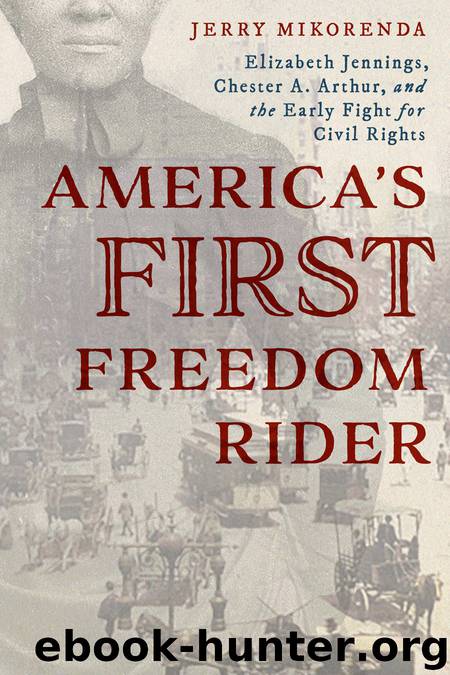America's First Freedom Rider by Jerry Mikorenda

Author:Jerry Mikorenda
Language: eng
Format: epub
Publisher: Lyons Press
Published: 2019-10-17T16:00:00+00:00
That afternoon, word of Elizabeth’s brave stand and brutal assault quickly spread throughout the African American community. In a show of support, her church called a public meeting the next day to decide a course of action. Elizabeth was unable to attend the meeting herself because “I am quite sore and stiff from the treatment I received from those monsters in human form yesterday afternoon,” she wrote from home.
In their annual reports to the state railroad commissioners, each rail line must catalog accidents under one of eight categories. “Fell or thrown from cars” was listed as a possible cause for death that must be reported by the railroad. In her absence, she provided a written statement about the attack that her father read. It served as a basis for newspaper accounts appearing in the New-York Daily Tribune and Frederick Douglass’ Paper.
The meeting at the church was a lively expression of outrage, unity, and community empowerment. This was a time for action. By that, those attending meant legal action. Somehow the Third Avenue Railroad must be made to own up to the behavior of its employees and recognize “colored citizens [have] the equal right to accommodations of ‘transit’ in the cars,” as the Tribune reported from the meeting in its July 19, 1854, issue. A committee organized by her father was formed to bring about a civil lawsuit.
All those present unanimously passed three resolutions. The first stated that the railroad’s behavior was “intolerant” and called for the “reprehension of the respectable portion of the community.” A second sought to sue the railroad and demanded a ruling on the legal status of African Americans using the transit system. The last resolution targeted media outlets such as the Tribune and Douglass’ Paper to ensure that Elizabeth’s case would be reported in the press.
Enthusiasm during the meeting ran high. It was time for free black New Yorkers to be recognized as equal citizens. Everyone in the audience knew that being able to go where you wanted when you wanted was the first step in reaching equality. But buried in those three resolutions was a dose of reality. The words “if possible … bring the whole affair to legal authorities” underlined the difficulties the group faced. Who would take on the cause of a black female looking for equality in a city bonded to the slave trade?
The proceeding closed on a spiritual hymn. The thoughts of everyone in the church were on the fallen schoolteacher at home humiliated and physically ailing. As they raised their voices in unity, it remained an open question if they would ever be heard beyond the church walls on Second Avenue and Sixth Street.
Download
This site does not store any files on its server. We only index and link to content provided by other sites. Please contact the content providers to delete copyright contents if any and email us, we'll remove relevant links or contents immediately.
Becoming by Michelle Obama(10026)
Beartown by Fredrik Backman(5754)
The Last Black Unicorn by Tiffany Haddish(5635)
Man's Search for Meaning by Viktor Frankl(4606)
The Book of Joy by Dalai Lama(3986)
The Five People You Meet in Heaven by Mitch Albom(3569)
In a Sunburned Country by Bill Bryson(3542)
The Choice by Edith Eva Eger(3469)
Full Circle by Michael Palin(3450)
The Mamba Mentality by Kobe Bryant(3277)
The Social Psychology of Inequality by Unknown(3031)
Imagine Me by Tahereh Mafi(2959)
Book of Life by Deborah Harkness(2939)
The Checklist Manifesto by Atul Gawande(2853)
Less by Andrew Sean Greer(2694)
A Burst of Light by Audre Lorde(2607)
The Big Twitch by Sean Dooley(2436)
No Room for Small Dreams by Shimon Peres(2368)
Everest the Cruel Way by Joe Tasker(2342)
